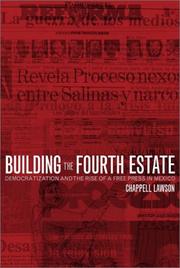| Listing 1 - 3 of 3 |
Sort by
|
Book
ISBN: 9783837632941 3837632946 3839432944 9783839432945 Year: 2016 Publisher: Bielefeld
Abstract | Keywords | Export | Availability | Bookmark
 Loading...
Loading...Choose an application
- Reference Manager
- EndNote
- RefWorks (Direct export to RefWorks)
The book brings together experts from Media and Communication Studies with Postcolonial Studies scholars to illustrate how the two fields may challenge and enrich each other. Its essays introduce readers to selected topics including »Media Convergence«, »Transcultural Subjectivity«, »Hegemony«, »Piracy« and »Media History and Colonialism«. Drawing on examples from film, literature, music, TV and the internet, the contributors investigate the transnational dimensions in today's media, engage with local and global media politics and discuss media outlets as economic agents, thus illustrating mechanisms of power in postcolonial and neo-colonial mediascapes. »[Der Sammelband macht] durch diese kritische Beschäftigung mit multiplen Perspektiven und Gegenständen auf die zahlreichen Interaktionspotentiale von Postkolonialen Studien und Medienwissenschaften aufmerksam und inspiriert dazu, diese Bereiche auch weiterhin in Dialog miteinander zu bringen.« Syntia Hasenöhrl, [rezens.tfm], 15.11.2018 "This volume is a methodologically diverse and knowledgeable cornucopia of insights into one of the most vibrant and essential fields of contemporary media studies." Eckart Voigts, Anglistik, 28/1 (2017) »Der Band verfolgt ein zeitgemäßes und mutiges Vorhaben, das forscherisches Interesse weckt. Er lädt zu einer breiten (selbst-)kritischen Diskussion darüber ein, was Postcolonial Studies heute sind und worin der Gewinn vermeintlich postkolonialer medienwissenschaftlicher Perspektiven liegt.« Kaya de Wolff, r:k:m, 24.10.2016 Besprochen in: GMK-Newsletter, 3 (2017)
Mass media and culture. --- Postcolonialism. --- Mass media and globalization. --- Mass media --- Post-colonialism --- Postcolonial theory --- Political science --- Decolonization --- Culture and mass media --- Culture --- Communication in politics --- Globalization and mass media --- Globalization --- Political aspects. --- Colonisation. Decolonisation --- Mass communications --- Postcolonialism --- Media studies --- Postcolonial Studies; Media Studies; Global Media; Transnationalism; Media Politics; Cultural Industries; Postcolonialism; Media; Media Theory; British Studies; Cultural Studies --- British Studies. --- Cultural Industries. --- Cultural Studies. --- Global Media. --- Media Politics. --- Media Studies. --- Media Theory. --- Media. --- Transnationalism.

ISBN: 0520936205 1597345156 9780520936201 0585441278 9780585441276 9780520231702 0520231708 9780520231719 0520231716 0520231708 0520231716 9781597345156 Year: 2002 Publisher: Berkeley University of California Press
Abstract | Keywords | Export | Availability | Bookmark
 Loading...
Loading...Choose an application
- Reference Manager
- EndNote
- RefWorks (Direct export to RefWorks)
Based on an in-depth examination of Mexico's print and broadcast media over the last twenty-five years, this book is the most richly detailed account available of the role of the media in democratization, demonstrating the reciprocal relationship between changes in the press and changes in the political system. In addition to illuminating the nature of political change in Mexico, this accessibly written study also has broad implications for understanding the role of the mass media in democratization around the world.
Freedom of the press. --- Freedom of the press - Mexico. --- Government and the press. --- Government and the press-- Mexico-- History-- 20th century. --- Journalism --- Political sociology --- Mass communications --- Mexico --- Government and the press -- Mexico -- History -- 20th century.. --- Freedom of the press -- Mexico. --- broadcast media. --- democracy. --- democratization. --- free press. --- freedom of press. --- global politics. --- globalization. --- historians. --- journalism. --- journalists. --- latin america. --- mass media. --- media control. --- media coverage. --- media politics. --- media relations. --- mexican media. --- mexican politics. --- mexican press. --- mexico. --- modern history. --- modern mexico. --- nonfiction. --- political changes. --- press power. --- print media. --- role of the media. --- role of the press. --- social sciences. --- students and teachers. --- textbooks. --- Government and the press --- Freedom of the press --- History
Book
ISBN: 9633860423 9789633860427 9789633860410 9633860415 Year: 2014 Publisher: Budapest, Hungary New York, NY
Abstract | Keywords | Export | Availability | Bookmark
 Loading...
Loading...Choose an application
- Reference Manager
- EndNote
- RefWorks (Direct export to RefWorks)
This book compares media and political systems in East-Central as well as in Western Europe in order to identify the reasons possibly responsible for the extensive and intensive party control over the media. This phenomenon is widely experienced in many of the former communist countries since the political transformation. The author argues that differences in media freedom and in the politicization of the news media are rooted in differences in party structures between old and new democracies, and, notably, the fact that young parties in the new members of the European Union are short of resources, which makes them more likely to take control of and to exploit media resources.
Political parties --- Communication in politics --- Freedom of the press --- Journalism --- Parties, Political --- Party systems, Political --- Political party systems --- Political science --- Divided government --- Intra-party disagreements (Political parties) --- Political conventions --- Political communication --- Censorship of the press --- Liberty of the press --- Press --- Press censorship --- Censorship --- Freedom of expression --- Government and the press --- Writing (Authorship) --- Literature --- Publicity --- Fake news --- Law and legislation --- Journalisme --- Liberté de la presse --- Communication politique --- Partis politiques --- Eastern Europe, Democracy, Media politics, Media regulation, Political parties, Postcommunism. --- Political sociology --- Mass communications --- Eastern and Central Europe --- Journalism-Europe, Eastern. --- Journalism-Europe, Central. --- Freedom of the press-Europe, Eastern. --- Freedom of the press-Europe, Central. --- Communication in politics-Europe, Eastern. --- Communication in politics-Europe, Central. --- Political parties-Europe, Eastern. --- Political parties-Europe, Central.
| Listing 1 - 3 of 3 |
Sort by
|

 Search
Search Feedback
Feedback About UniCat
About UniCat  Help
Help News
News